Intelligence Stability Across Lifespan: Factors & Evidence Analysis
VerifiedAdded on 2023/06/10
|13
|3991
|269
Essay
AI Summary
This essay examines the assertion that intelligence remains stable throughout a person's life, presenting arguments for and against this claim. It explores the concept of intelligence as the ability to retain knowledge and use reasoning to solve problems, highlighting its relative stability from infancy through adolescence. The essay delves into factors influencing intelligence, such as heredity, environment, cultural influences, race, and nationality, discussing how these elements can affect cognitive development and intellectual potential at different ages. It references various studies and theories related to fluid and crystallized intelligence, emphasizing the importance of both genetic and environmental factors in shaping an individual's intellectual capacity. The essay concludes by underscoring the complex interplay between these factors and their impact on intelligence across the lifespan.
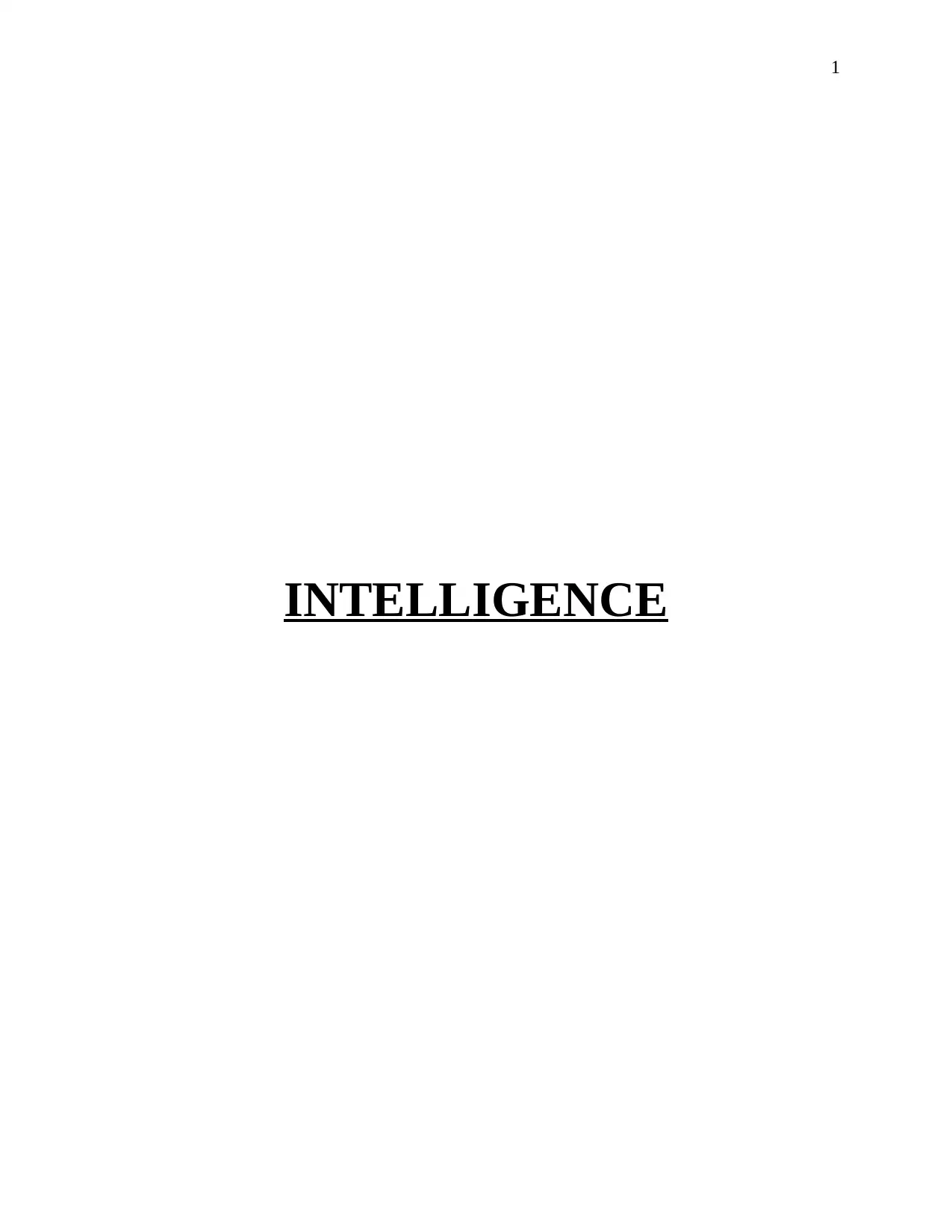
1
INTELLIGENCE
INTELLIGENCE
Paraphrase This Document
Need a fresh take? Get an instant paraphrase of this document with our AI Paraphraser
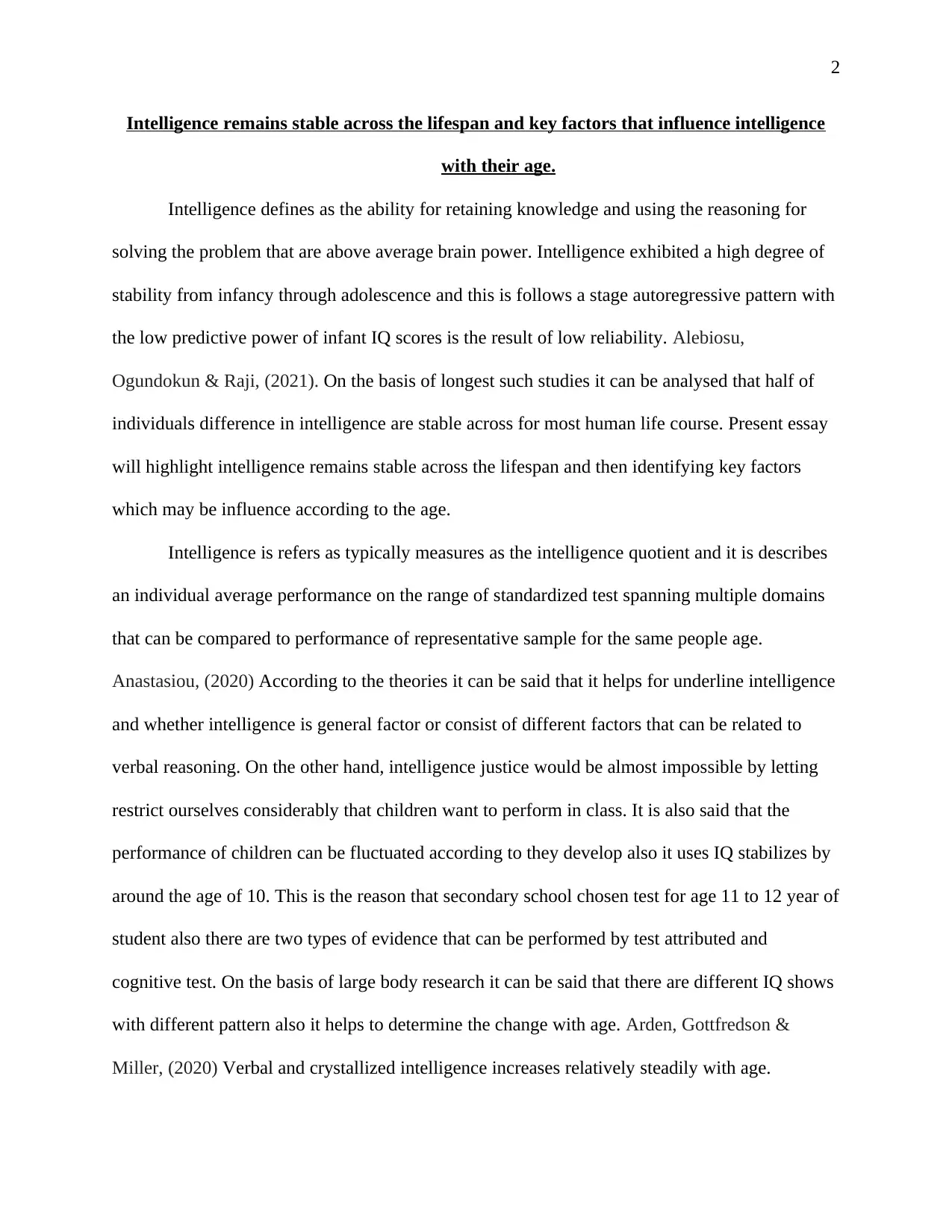
2
Intelligence remains stable across the lifespan and key factors that influence intelligence
with their age.
Intelligence defines as the ability for retaining knowledge and using the reasoning for
solving the problem that are above average brain power. Intelligence exhibited a high degree of
stability from infancy through adolescence and this is follows a stage autoregressive pattern with
the low predictive power of infant IQ scores is the result of low reliability. Alebiosu,
Ogundokun & Raji, (2021). On the basis of longest such studies it can be analysed that half of
individuals difference in intelligence are stable across for most human life course. Present essay
will highlight intelligence remains stable across the lifespan and then identifying key factors
which may be influence according to the age.
Intelligence is refers as typically measures as the intelligence quotient and it is describes
an individual average performance on the range of standardized test spanning multiple domains
that can be compared to performance of representative sample for the same people age.
Anastasiou, (2020) According to the theories it can be said that it helps for underline intelligence
and whether intelligence is general factor or consist of different factors that can be related to
verbal reasoning. On the other hand, intelligence justice would be almost impossible by letting
restrict ourselves considerably that children want to perform in class. It is also said that the
performance of children can be fluctuated according to they develop also it uses IQ stabilizes by
around the age of 10. This is the reason that secondary school chosen test for age 11 to 12 year of
student also there are two types of evidence that can be performed by test attributed and
cognitive test. On the basis of large body research it can be said that there are different IQ shows
with different pattern also it helps to determine the change with age. Arden, Gottfredson &
Miller, (2020) Verbal and crystallized intelligence increases relatively steadily with age.
Intelligence remains stable across the lifespan and key factors that influence intelligence
with their age.
Intelligence defines as the ability for retaining knowledge and using the reasoning for
solving the problem that are above average brain power. Intelligence exhibited a high degree of
stability from infancy through adolescence and this is follows a stage autoregressive pattern with
the low predictive power of infant IQ scores is the result of low reliability. Alebiosu,
Ogundokun & Raji, (2021). On the basis of longest such studies it can be analysed that half of
individuals difference in intelligence are stable across for most human life course. Present essay
will highlight intelligence remains stable across the lifespan and then identifying key factors
which may be influence according to the age.
Intelligence is refers as typically measures as the intelligence quotient and it is describes
an individual average performance on the range of standardized test spanning multiple domains
that can be compared to performance of representative sample for the same people age.
Anastasiou, (2020) According to the theories it can be said that it helps for underline intelligence
and whether intelligence is general factor or consist of different factors that can be related to
verbal reasoning. On the other hand, intelligence justice would be almost impossible by letting
restrict ourselves considerably that children want to perform in class. It is also said that the
performance of children can be fluctuated according to they develop also it uses IQ stabilizes by
around the age of 10. This is the reason that secondary school chosen test for age 11 to 12 year of
student also there are two types of evidence that can be performed by test attributed and
cognitive test. On the basis of large body research it can be said that there are different IQ shows
with different pattern also it helps to determine the change with age. Arden, Gottfredson &
Miller, (2020) Verbal and crystallized intelligence increases relatively steadily with age.
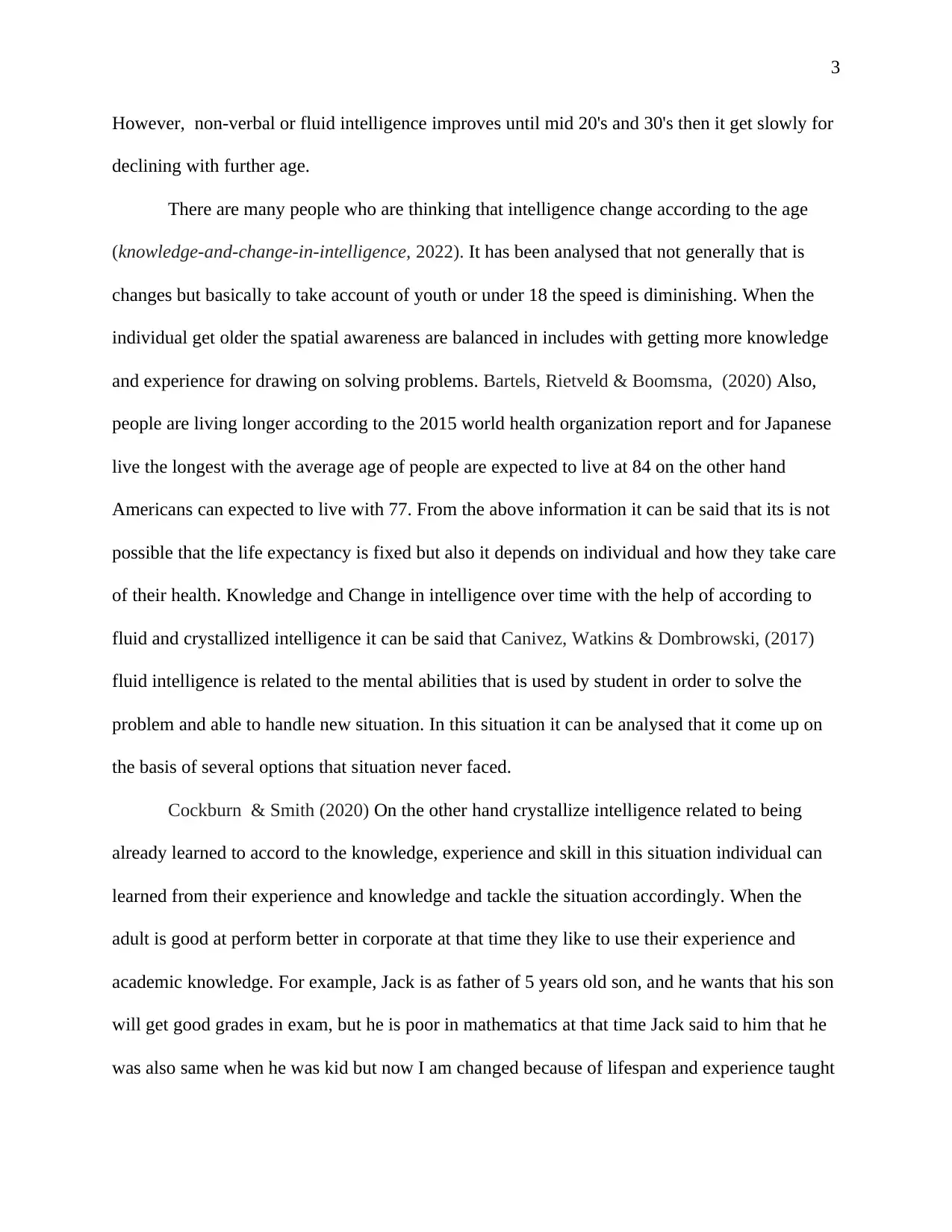
3
However, non-verbal or fluid intelligence improves until mid 20's and 30's then it get slowly for
declining with further age.
There are many people who are thinking that intelligence change according to the age
(knowledge-and-change-in-intelligence, 2022). It has been analysed that not generally that is
changes but basically to take account of youth or under 18 the speed is diminishing. When the
individual get older the spatial awareness are balanced in includes with getting more knowledge
and experience for drawing on solving problems. Bartels, Rietveld & Boomsma, (2020) Also,
people are living longer according to the 2015 world health organization report and for Japanese
live the longest with the average age of people are expected to live at 84 on the other hand
Americans can expected to live with 77. From the above information it can be said that its is not
possible that the life expectancy is fixed but also it depends on individual and how they take care
of their health. Knowledge and Change in intelligence over time with the help of according to
fluid and crystallized intelligence it can be said that Canivez, Watkins & Dombrowski, (2017)
fluid intelligence is related to the mental abilities that is used by student in order to solve the
problem and able to handle new situation. In this situation it can be analysed that it come up on
the basis of several options that situation never faced.
Cockburn & Smith (2020) On the other hand crystallize intelligence related to being
already learned to accord to the knowledge, experience and skill in this situation individual can
learned from their experience and knowledge and tackle the situation accordingly. When the
adult is good at perform better in corporate at that time they like to use their experience and
academic knowledge. For example, Jack is as father of 5 years old son, and he wants that his son
will get good grades in exam, but he is poor in mathematics at that time Jack said to him that he
was also same when he was kid but now I am changed because of lifespan and experience taught
However, non-verbal or fluid intelligence improves until mid 20's and 30's then it get slowly for
declining with further age.
There are many people who are thinking that intelligence change according to the age
(knowledge-and-change-in-intelligence, 2022). It has been analysed that not generally that is
changes but basically to take account of youth or under 18 the speed is diminishing. When the
individual get older the spatial awareness are balanced in includes with getting more knowledge
and experience for drawing on solving problems. Bartels, Rietveld & Boomsma, (2020) Also,
people are living longer according to the 2015 world health organization report and for Japanese
live the longest with the average age of people are expected to live at 84 on the other hand
Americans can expected to live with 77. From the above information it can be said that its is not
possible that the life expectancy is fixed but also it depends on individual and how they take care
of their health. Knowledge and Change in intelligence over time with the help of according to
fluid and crystallized intelligence it can be said that Canivez, Watkins & Dombrowski, (2017)
fluid intelligence is related to the mental abilities that is used by student in order to solve the
problem and able to handle new situation. In this situation it can be analysed that it come up on
the basis of several options that situation never faced.
Cockburn & Smith (2020) On the other hand crystallize intelligence related to being
already learned to accord to the knowledge, experience and skill in this situation individual can
learned from their experience and knowledge and tackle the situation accordingly. When the
adult is good at perform better in corporate at that time they like to use their experience and
academic knowledge. For example, Jack is as father of 5 years old son, and he wants that his son
will get good grades in exam, but he is poor in mathematics at that time Jack said to him that he
was also same when he was kid but now I am changed because of lifespan and experience taught
⊘ This is a preview!⊘
Do you want full access?
Subscribe today to unlock all pages.

Trusted by 1+ million students worldwide
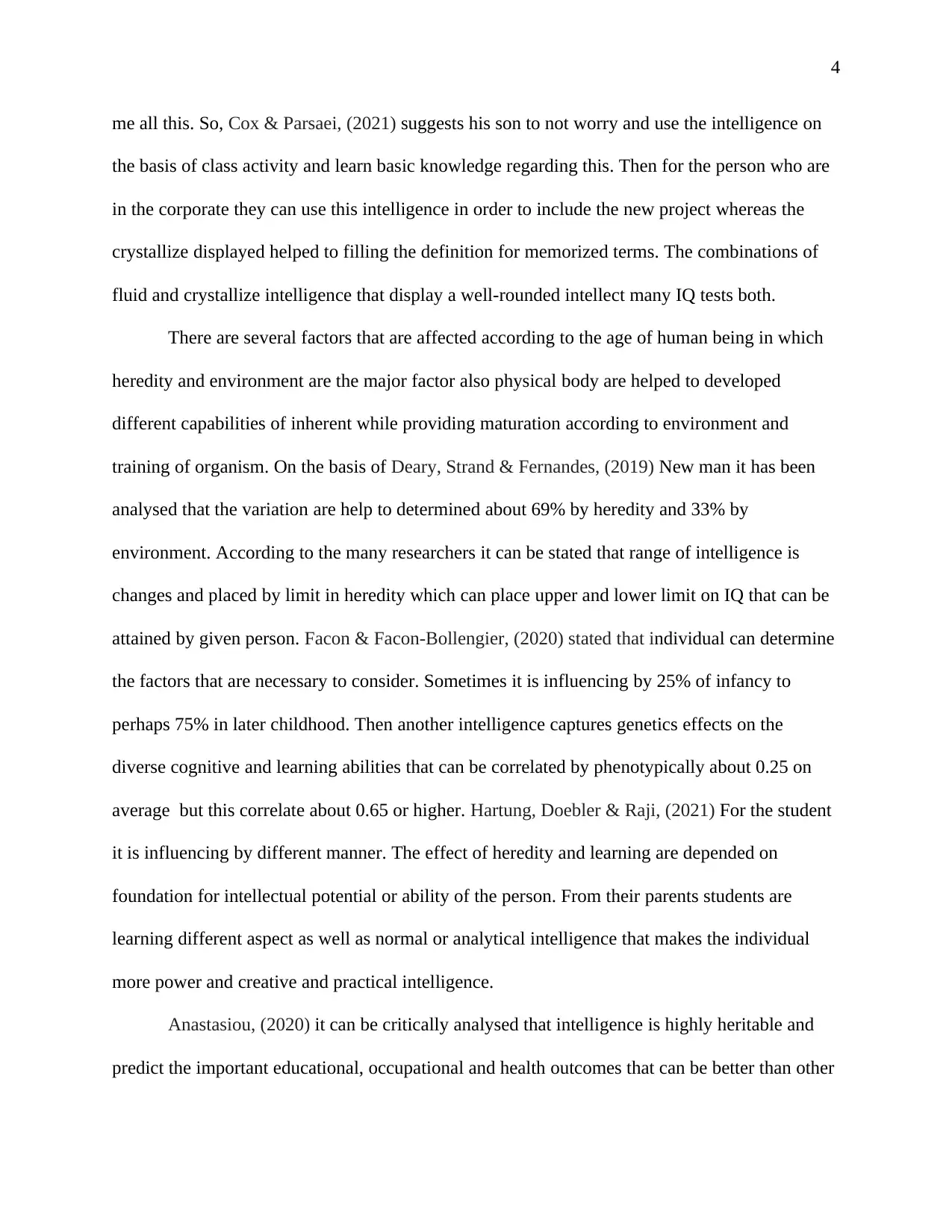
4
me all this. So, Cox & Parsaei, (2021) suggests his son to not worry and use the intelligence on
the basis of class activity and learn basic knowledge regarding this. Then for the person who are
in the corporate they can use this intelligence in order to include the new project whereas the
crystallize displayed helped to filling the definition for memorized terms. The combinations of
fluid and crystallize intelligence that display a well-rounded intellect many IQ tests both.
There are several factors that are affected according to the age of human being in which
heredity and environment are the major factor also physical body are helped to developed
different capabilities of inherent while providing maturation according to environment and
training of organism. On the basis of Deary, Strand & Fernandes, (2019) New man it has been
analysed that the variation are help to determined about 69% by heredity and 33% by
environment. According to the many researchers it can be stated that range of intelligence is
changes and placed by limit in heredity which can place upper and lower limit on IQ that can be
attained by given person. Facon & Facon‐Bollengier, (2020) stated that individual can determine
the factors that are necessary to consider. Sometimes it is influencing by 25% of infancy to
perhaps 75% in later childhood. Then another intelligence captures genetics effects on the
diverse cognitive and learning abilities that can be correlated by phenotypically about 0.25 on
average but this correlate about 0.65 or higher. Hartung, Doebler & Raji, (2021) For the student
it is influencing by different manner. The effect of heredity and learning are depended on
foundation for intellectual potential or ability of the person. From their parents students are
learning different aspect as well as normal or analytical intelligence that makes the individual
more power and creative and practical intelligence.
Anastasiou, (2020) it can be critically analysed that intelligence is highly heritable and
predict the important educational, occupational and health outcomes that can be better than other
me all this. So, Cox & Parsaei, (2021) suggests his son to not worry and use the intelligence on
the basis of class activity and learn basic knowledge regarding this. Then for the person who are
in the corporate they can use this intelligence in order to include the new project whereas the
crystallize displayed helped to filling the definition for memorized terms. The combinations of
fluid and crystallize intelligence that display a well-rounded intellect many IQ tests both.
There are several factors that are affected according to the age of human being in which
heredity and environment are the major factor also physical body are helped to developed
different capabilities of inherent while providing maturation according to environment and
training of organism. On the basis of Deary, Strand & Fernandes, (2019) New man it has been
analysed that the variation are help to determined about 69% by heredity and 33% by
environment. According to the many researchers it can be stated that range of intelligence is
changes and placed by limit in heredity which can place upper and lower limit on IQ that can be
attained by given person. Facon & Facon‐Bollengier, (2020) stated that individual can determine
the factors that are necessary to consider. Sometimes it is influencing by 25% of infancy to
perhaps 75% in later childhood. Then another intelligence captures genetics effects on the
diverse cognitive and learning abilities that can be correlated by phenotypically about 0.25 on
average but this correlate about 0.65 or higher. Hartung, Doebler & Raji, (2021) For the student
it is influencing by different manner. The effect of heredity and learning are depended on
foundation for intellectual potential or ability of the person. From their parents students are
learning different aspect as well as normal or analytical intelligence that makes the individual
more power and creative and practical intelligence.
Anastasiou, (2020) it can be critically analysed that intelligence is highly heritable and
predict the important educational, occupational and health outcomes that can be better than other
Paraphrase This Document
Need a fresh take? Get an instant paraphrase of this document with our AI Paraphraser
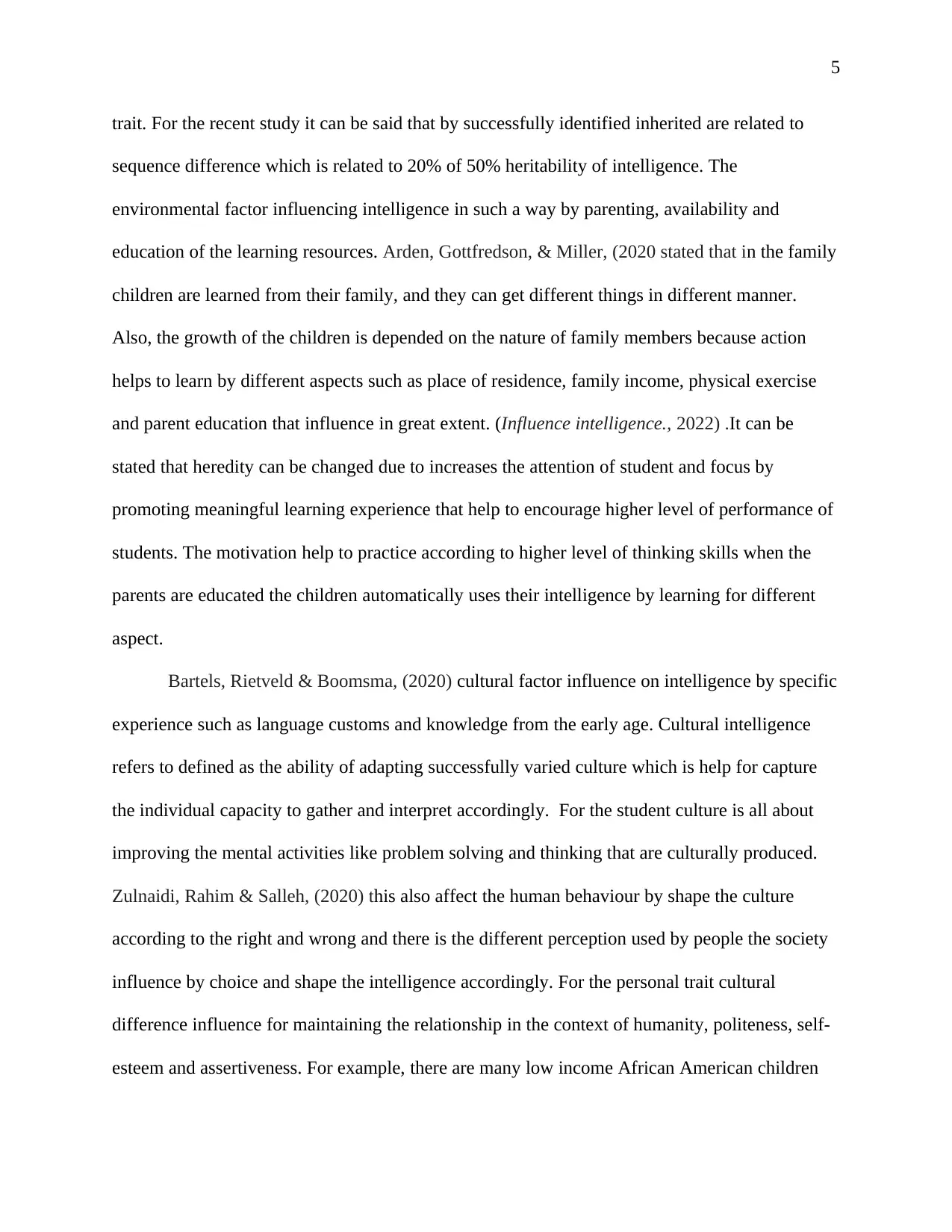
5
trait. For the recent study it can be said that by successfully identified inherited are related to
sequence difference which is related to 20% of 50% heritability of intelligence. The
environmental factor influencing intelligence in such a way by parenting, availability and
education of the learning resources. Arden, Gottfredson, & Miller, (2020 stated that in the family
children are learned from their family, and they can get different things in different manner.
Also, the growth of the children is depended on the nature of family members because action
helps to learn by different aspects such as place of residence, family income, physical exercise
and parent education that influence in great extent. (Influence intelligence., 2022) .It can be
stated that heredity can be changed due to increases the attention of student and focus by
promoting meaningful learning experience that help to encourage higher level of performance of
students. The motivation help to practice according to higher level of thinking skills when the
parents are educated the children automatically uses their intelligence by learning for different
aspect.
Bartels, Rietveld & Boomsma, (2020) cultural factor influence on intelligence by specific
experience such as language customs and knowledge from the early age. Cultural intelligence
refers to defined as the ability of adapting successfully varied culture which is help for capture
the individual capacity to gather and interpret accordingly. For the student culture is all about
improving the mental activities like problem solving and thinking that are culturally produced.
Zulnaidi, Rahim & Salleh, (2020) this also affect the human behaviour by shape the culture
according to the right and wrong and there is the different perception used by people the society
influence by choice and shape the intelligence accordingly. For the personal trait cultural
difference influence for maintaining the relationship in the context of humanity, politeness, self-
esteem and assertiveness. For example, there are many low income African American children
trait. For the recent study it can be said that by successfully identified inherited are related to
sequence difference which is related to 20% of 50% heritability of intelligence. The
environmental factor influencing intelligence in such a way by parenting, availability and
education of the learning resources. Arden, Gottfredson, & Miller, (2020 stated that in the family
children are learned from their family, and they can get different things in different manner.
Also, the growth of the children is depended on the nature of family members because action
helps to learn by different aspects such as place of residence, family income, physical exercise
and parent education that influence in great extent. (Influence intelligence., 2022) .It can be
stated that heredity can be changed due to increases the attention of student and focus by
promoting meaningful learning experience that help to encourage higher level of performance of
students. The motivation help to practice according to higher level of thinking skills when the
parents are educated the children automatically uses their intelligence by learning for different
aspect.
Bartels, Rietveld & Boomsma, (2020) cultural factor influence on intelligence by specific
experience such as language customs and knowledge from the early age. Cultural intelligence
refers to defined as the ability of adapting successfully varied culture which is help for capture
the individual capacity to gather and interpret accordingly. For the student culture is all about
improving the mental activities like problem solving and thinking that are culturally produced.
Zulnaidi, Rahim & Salleh, (2020) this also affect the human behaviour by shape the culture
according to the right and wrong and there is the different perception used by people the society
influence by choice and shape the intelligence accordingly. For the personal trait cultural
difference influence for maintaining the relationship in the context of humanity, politeness, self-
esteem and assertiveness. For example, there are many low income African American children
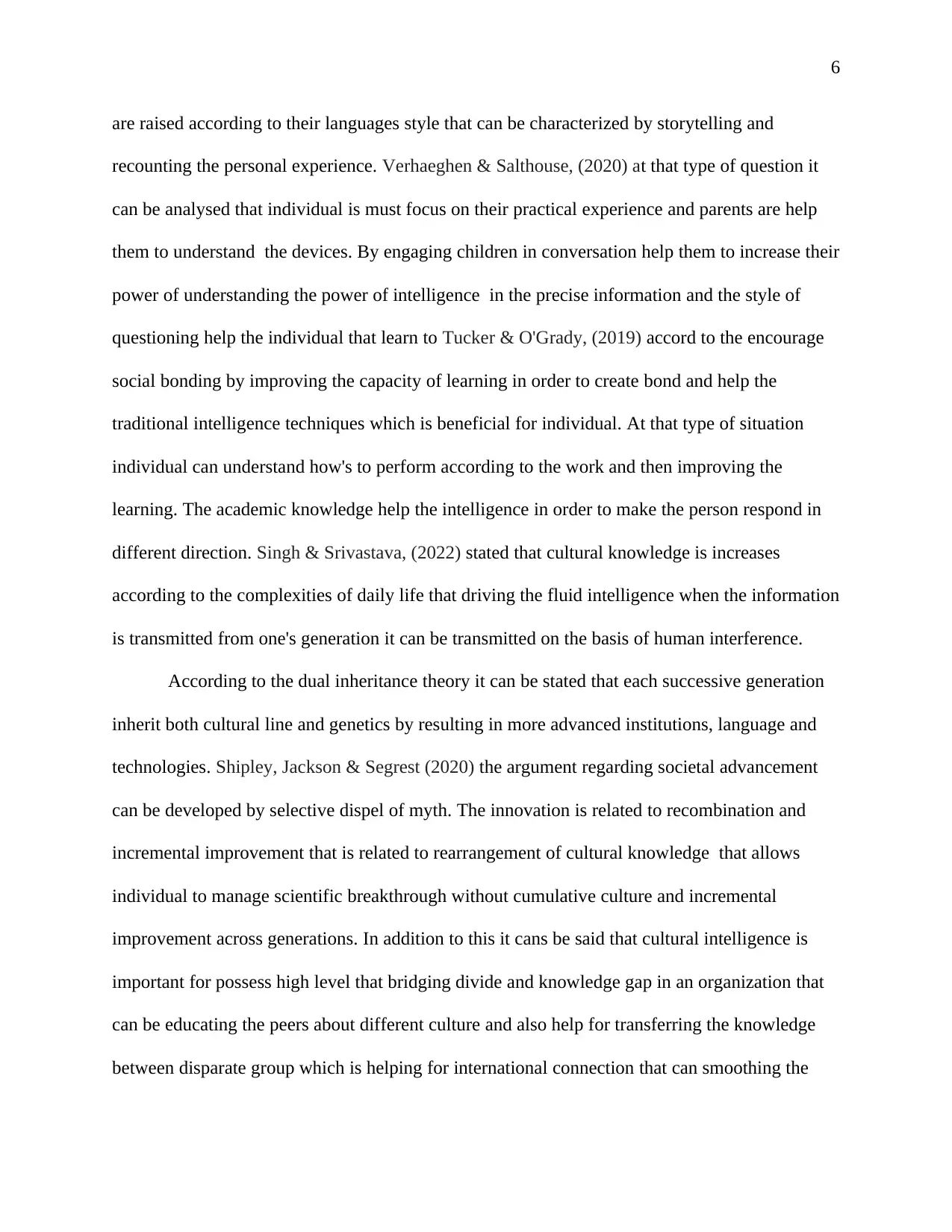
6
are raised according to their languages style that can be characterized by storytelling and
recounting the personal experience. Verhaeghen & Salthouse, (2020) at that type of question it
can be analysed that individual is must focus on their practical experience and parents are help
them to understand the devices. By engaging children in conversation help them to increase their
power of understanding the power of intelligence in the precise information and the style of
questioning help the individual that learn to Tucker & O'Grady, (2019) accord to the encourage
social bonding by improving the capacity of learning in order to create bond and help the
traditional intelligence techniques which is beneficial for individual. At that type of situation
individual can understand how's to perform according to the work and then improving the
learning. The academic knowledge help the intelligence in order to make the person respond in
different direction. Singh & Srivastava, (2022) stated that cultural knowledge is increases
according to the complexities of daily life that driving the fluid intelligence when the information
is transmitted from one's generation it can be transmitted on the basis of human interference.
According to the dual inheritance theory it can be stated that each successive generation
inherit both cultural line and genetics by resulting in more advanced institutions, language and
technologies. Shipley, Jackson & Segrest (2020) the argument regarding societal advancement
can be developed by selective dispel of myth. The innovation is related to recombination and
incremental improvement that is related to rearrangement of cultural knowledge that allows
individual to manage scientific breakthrough without cumulative culture and incremental
improvement across generations. In addition to this it cans be said that cultural intelligence is
important for possess high level that bridging divide and knowledge gap in an organization that
can be educating the peers about different culture and also help for transferring the knowledge
between disparate group which is helping for international connection that can smoothing the
are raised according to their languages style that can be characterized by storytelling and
recounting the personal experience. Verhaeghen & Salthouse, (2020) at that type of question it
can be analysed that individual is must focus on their practical experience and parents are help
them to understand the devices. By engaging children in conversation help them to increase their
power of understanding the power of intelligence in the precise information and the style of
questioning help the individual that learn to Tucker & O'Grady, (2019) accord to the encourage
social bonding by improving the capacity of learning in order to create bond and help the
traditional intelligence techniques which is beneficial for individual. At that type of situation
individual can understand how's to perform according to the work and then improving the
learning. The academic knowledge help the intelligence in order to make the person respond in
different direction. Singh & Srivastava, (2022) stated that cultural knowledge is increases
according to the complexities of daily life that driving the fluid intelligence when the information
is transmitted from one's generation it can be transmitted on the basis of human interference.
According to the dual inheritance theory it can be stated that each successive generation
inherit both cultural line and genetics by resulting in more advanced institutions, language and
technologies. Shipley, Jackson & Segrest (2020) the argument regarding societal advancement
can be developed by selective dispel of myth. The innovation is related to recombination and
incremental improvement that is related to rearrangement of cultural knowledge that allows
individual to manage scientific breakthrough without cumulative culture and incremental
improvement across generations. In addition to this it cans be said that cultural intelligence is
important for possess high level that bridging divide and knowledge gap in an organization that
can be educating the peers about different culture and also help for transferring the knowledge
between disparate group which is helping for international connection that can smoothing the
⊘ This is a preview!⊘
Do you want full access?
Subscribe today to unlock all pages.

Trusted by 1+ million students worldwide
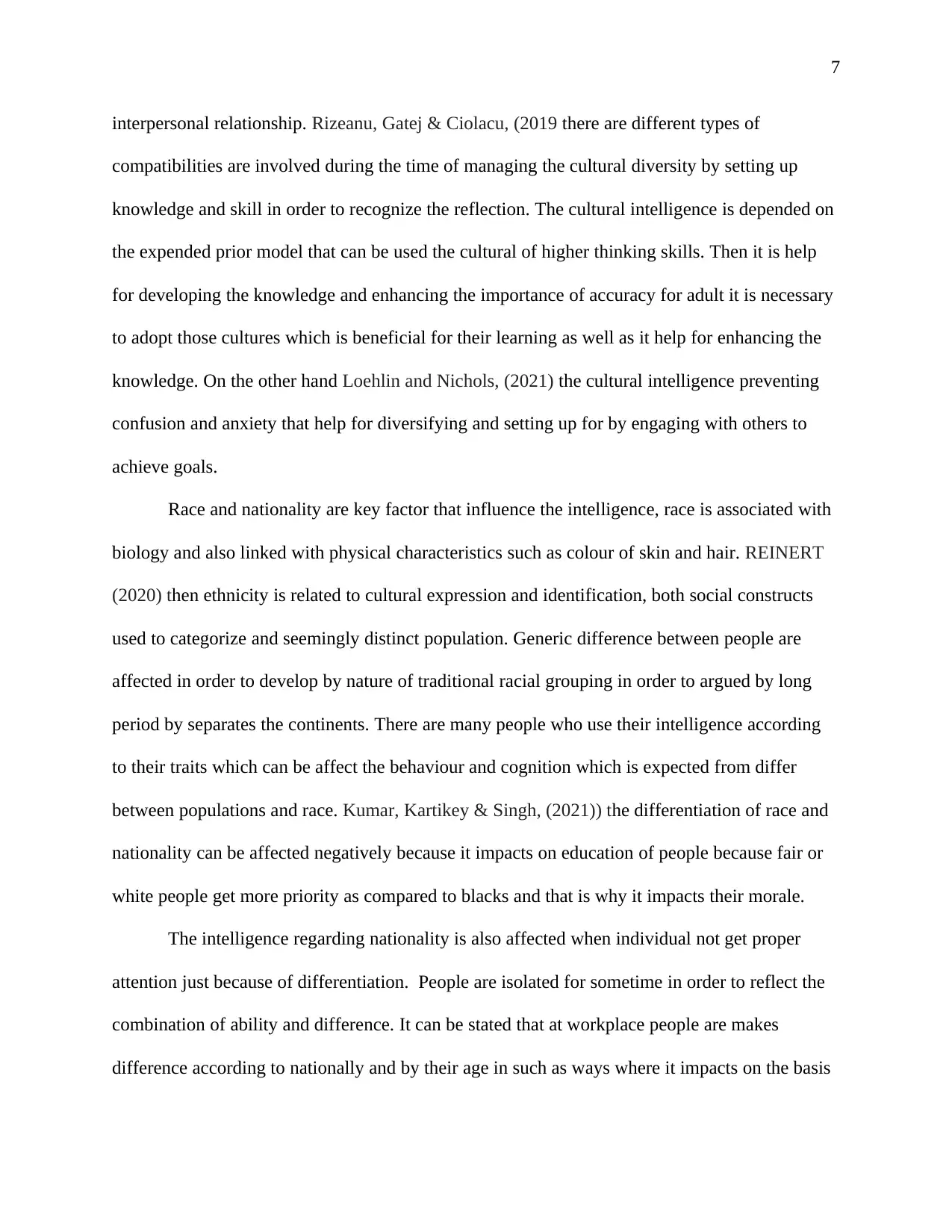
7
interpersonal relationship. Rizeanu, Gatej & Ciolacu, (2019 there are different types of
compatibilities are involved during the time of managing the cultural diversity by setting up
knowledge and skill in order to recognize the reflection. The cultural intelligence is depended on
the expended prior model that can be used the cultural of higher thinking skills. Then it is help
for developing the knowledge and enhancing the importance of accuracy for adult it is necessary
to adopt those cultures which is beneficial for their learning as well as it help for enhancing the
knowledge. On the other hand Loehlin and Nichols, (2021) the cultural intelligence preventing
confusion and anxiety that help for diversifying and setting up for by engaging with others to
achieve goals.
Race and nationality are key factor that influence the intelligence, race is associated with
biology and also linked with physical characteristics such as colour of skin and hair. REINERT
(2020) then ethnicity is related to cultural expression and identification, both social constructs
used to categorize and seemingly distinct population. Generic difference between people are
affected in order to develop by nature of traditional racial grouping in order to argued by long
period by separates the continents. There are many people who use their intelligence according
to their traits which can be affect the behaviour and cognition which is expected from differ
between populations and race. Kumar, Kartikey & Singh, (2021)) the differentiation of race and
nationality can be affected negatively because it impacts on education of people because fair or
white people get more priority as compared to blacks and that is why it impacts their morale.
The intelligence regarding nationality is also affected when individual not get proper
attention just because of differentiation. People are isolated for sometime in order to reflect the
combination of ability and difference. It can be stated that at workplace people are makes
difference according to nationally and by their age in such as ways where it impacts on the basis
interpersonal relationship. Rizeanu, Gatej & Ciolacu, (2019 there are different types of
compatibilities are involved during the time of managing the cultural diversity by setting up
knowledge and skill in order to recognize the reflection. The cultural intelligence is depended on
the expended prior model that can be used the cultural of higher thinking skills. Then it is help
for developing the knowledge and enhancing the importance of accuracy for adult it is necessary
to adopt those cultures which is beneficial for their learning as well as it help for enhancing the
knowledge. On the other hand Loehlin and Nichols, (2021) the cultural intelligence preventing
confusion and anxiety that help for diversifying and setting up for by engaging with others to
achieve goals.
Race and nationality are key factor that influence the intelligence, race is associated with
biology and also linked with physical characteristics such as colour of skin and hair. REINERT
(2020) then ethnicity is related to cultural expression and identification, both social constructs
used to categorize and seemingly distinct population. Generic difference between people are
affected in order to develop by nature of traditional racial grouping in order to argued by long
period by separates the continents. There are many people who use their intelligence according
to their traits which can be affect the behaviour and cognition which is expected from differ
between populations and race. Kumar, Kartikey & Singh, (2021)) the differentiation of race and
nationality can be affected negatively because it impacts on education of people because fair or
white people get more priority as compared to blacks and that is why it impacts their morale.
The intelligence regarding nationality is also affected when individual not get proper
attention just because of differentiation. People are isolated for sometime in order to reflect the
combination of ability and difference. It can be stated that at workplace people are makes
difference according to nationally and by their age in such as ways where it impacts on the basis
Paraphrase This Document
Need a fresh take? Get an instant paraphrase of this document with our AI Paraphraser
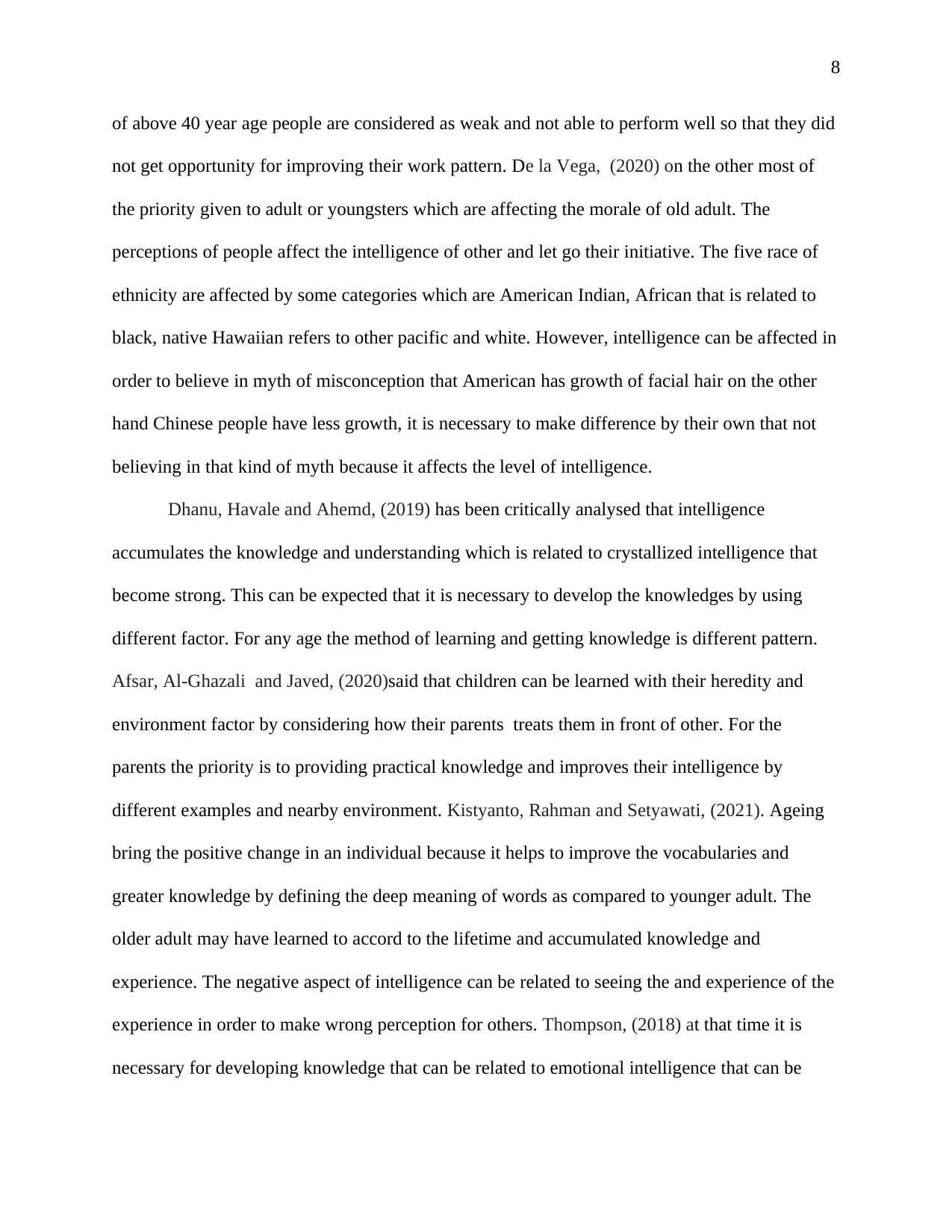
8
of above 40 year age people are considered as weak and not able to perform well so that they did
not get opportunity for improving their work pattern. De la Vega, (2020) on the other most of
the priority given to adult or youngsters which are affecting the morale of old adult. The
perceptions of people affect the intelligence of other and let go their initiative. The five race of
ethnicity are affected by some categories which are American Indian, African that is related to
black, native Hawaiian refers to other pacific and white. However, intelligence can be affected in
order to believe in myth of misconception that American has growth of facial hair on the other
hand Chinese people have less growth, it is necessary to make difference by their own that not
believing in that kind of myth because it affects the level of intelligence.
Dhanu, Havale and Ahemd, (2019) has been critically analysed that intelligence
accumulates the knowledge and understanding which is related to crystallized intelligence that
become strong. This can be expected that it is necessary to develop the knowledges by using
different factor. For any age the method of learning and getting knowledge is different pattern.
Afsar, Al-Ghazali and Javed, (2020)said that children can be learned with their heredity and
environment factor by considering how their parents treats them in front of other. For the
parents the priority is to providing practical knowledge and improves their intelligence by
different examples and nearby environment. Kistyanto, Rahman and Setyawati, (2021). Ageing
bring the positive change in an individual because it helps to improve the vocabularies and
greater knowledge by defining the deep meaning of words as compared to younger adult. The
older adult may have learned to accord to the lifetime and accumulated knowledge and
experience. The negative aspect of intelligence can be related to seeing the and experience of the
experience in order to make wrong perception for others. Thompson, (2018) at that time it is
necessary for developing knowledge that can be related to emotional intelligence that can be
of above 40 year age people are considered as weak and not able to perform well so that they did
not get opportunity for improving their work pattern. De la Vega, (2020) on the other most of
the priority given to adult or youngsters which are affecting the morale of old adult. The
perceptions of people affect the intelligence of other and let go their initiative. The five race of
ethnicity are affected by some categories which are American Indian, African that is related to
black, native Hawaiian refers to other pacific and white. However, intelligence can be affected in
order to believe in myth of misconception that American has growth of facial hair on the other
hand Chinese people have less growth, it is necessary to make difference by their own that not
believing in that kind of myth because it affects the level of intelligence.
Dhanu, Havale and Ahemd, (2019) has been critically analysed that intelligence
accumulates the knowledge and understanding which is related to crystallized intelligence that
become strong. This can be expected that it is necessary to develop the knowledges by using
different factor. For any age the method of learning and getting knowledge is different pattern.
Afsar, Al-Ghazali and Javed, (2020)said that children can be learned with their heredity and
environment factor by considering how their parents treats them in front of other. For the
parents the priority is to providing practical knowledge and improves their intelligence by
different examples and nearby environment. Kistyanto, Rahman and Setyawati, (2021). Ageing
bring the positive change in an individual because it helps to improve the vocabularies and
greater knowledge by defining the deep meaning of words as compared to younger adult. The
older adult may have learned to accord to the lifetime and accumulated knowledge and
experience. The negative aspect of intelligence can be related to seeing the and experience of the
experience in order to make wrong perception for others. Thompson, (2018) at that time it is
necessary for developing knowledge that can be related to emotional intelligence that can be
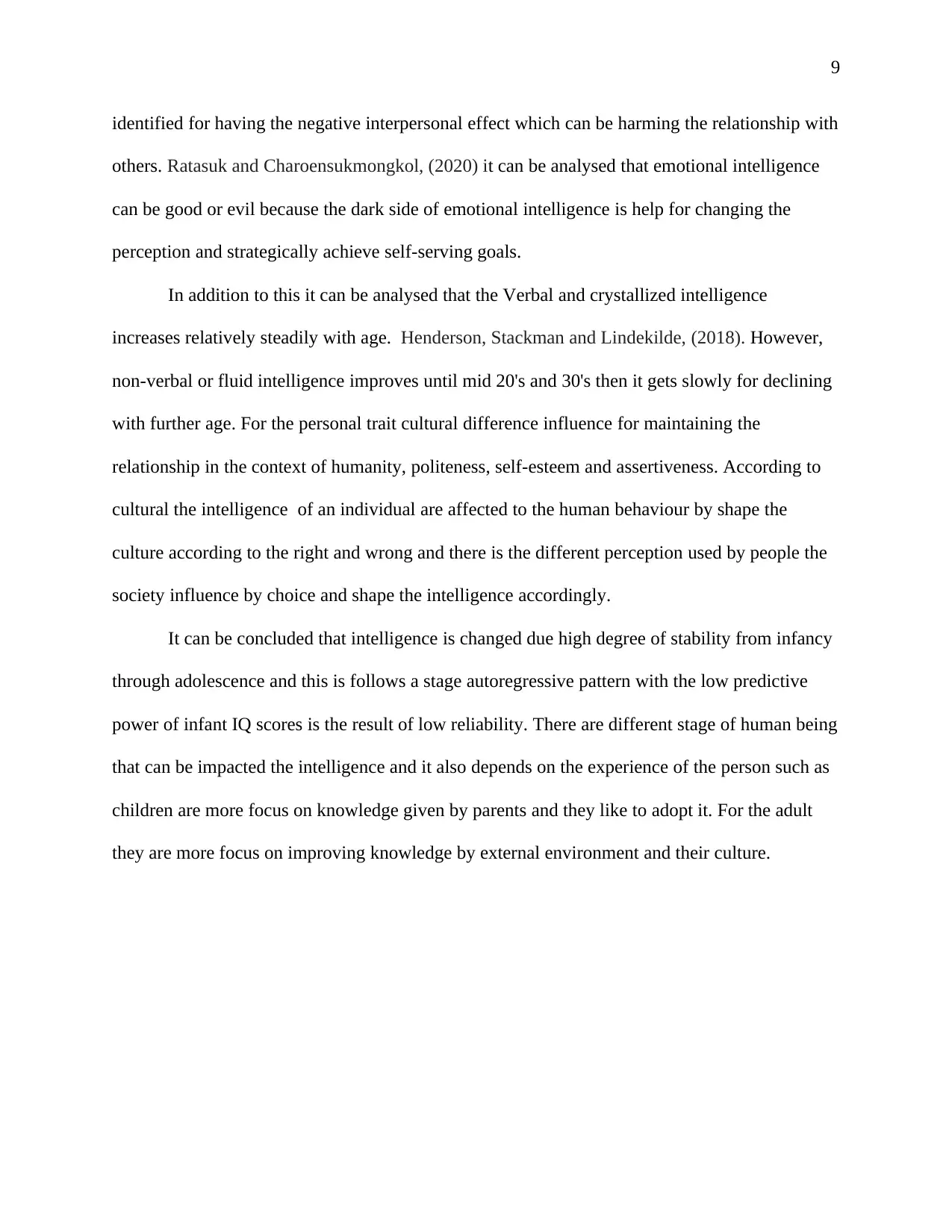
9
identified for having the negative interpersonal effect which can be harming the relationship with
others. Ratasuk and Charoensukmongkol, (2020) it can be analysed that emotional intelligence
can be good or evil because the dark side of emotional intelligence is help for changing the
perception and strategically achieve self-serving goals.
In addition to this it can be analysed that the Verbal and crystallized intelligence
increases relatively steadily with age. Henderson, Stackman and Lindekilde, (2018). However,
non-verbal or fluid intelligence improves until mid 20's and 30's then it gets slowly for declining
with further age. For the personal trait cultural difference influence for maintaining the
relationship in the context of humanity, politeness, self-esteem and assertiveness. According to
cultural the intelligence of an individual are affected to the human behaviour by shape the
culture according to the right and wrong and there is the different perception used by people the
society influence by choice and shape the intelligence accordingly.
It can be concluded that intelligence is changed due high degree of stability from infancy
through adolescence and this is follows a stage autoregressive pattern with the low predictive
power of infant IQ scores is the result of low reliability. There are different stage of human being
that can be impacted the intelligence and it also depends on the experience of the person such as
children are more focus on knowledge given by parents and they like to adopt it. For the adult
they are more focus on improving knowledge by external environment and their culture.
identified for having the negative interpersonal effect which can be harming the relationship with
others. Ratasuk and Charoensukmongkol, (2020) it can be analysed that emotional intelligence
can be good or evil because the dark side of emotional intelligence is help for changing the
perception and strategically achieve self-serving goals.
In addition to this it can be analysed that the Verbal and crystallized intelligence
increases relatively steadily with age. Henderson, Stackman and Lindekilde, (2018). However,
non-verbal or fluid intelligence improves until mid 20's and 30's then it gets slowly for declining
with further age. For the personal trait cultural difference influence for maintaining the
relationship in the context of humanity, politeness, self-esteem and assertiveness. According to
cultural the intelligence of an individual are affected to the human behaviour by shape the
culture according to the right and wrong and there is the different perception used by people the
society influence by choice and shape the intelligence accordingly.
It can be concluded that intelligence is changed due high degree of stability from infancy
through adolescence and this is follows a stage autoregressive pattern with the low predictive
power of infant IQ scores is the result of low reliability. There are different stage of human being
that can be impacted the intelligence and it also depends on the experience of the person such as
children are more focus on knowledge given by parents and they like to adopt it. For the adult
they are more focus on improving knowledge by external environment and their culture.
⊘ This is a preview!⊘
Do you want full access?
Subscribe today to unlock all pages.

Trusted by 1+ million students worldwide
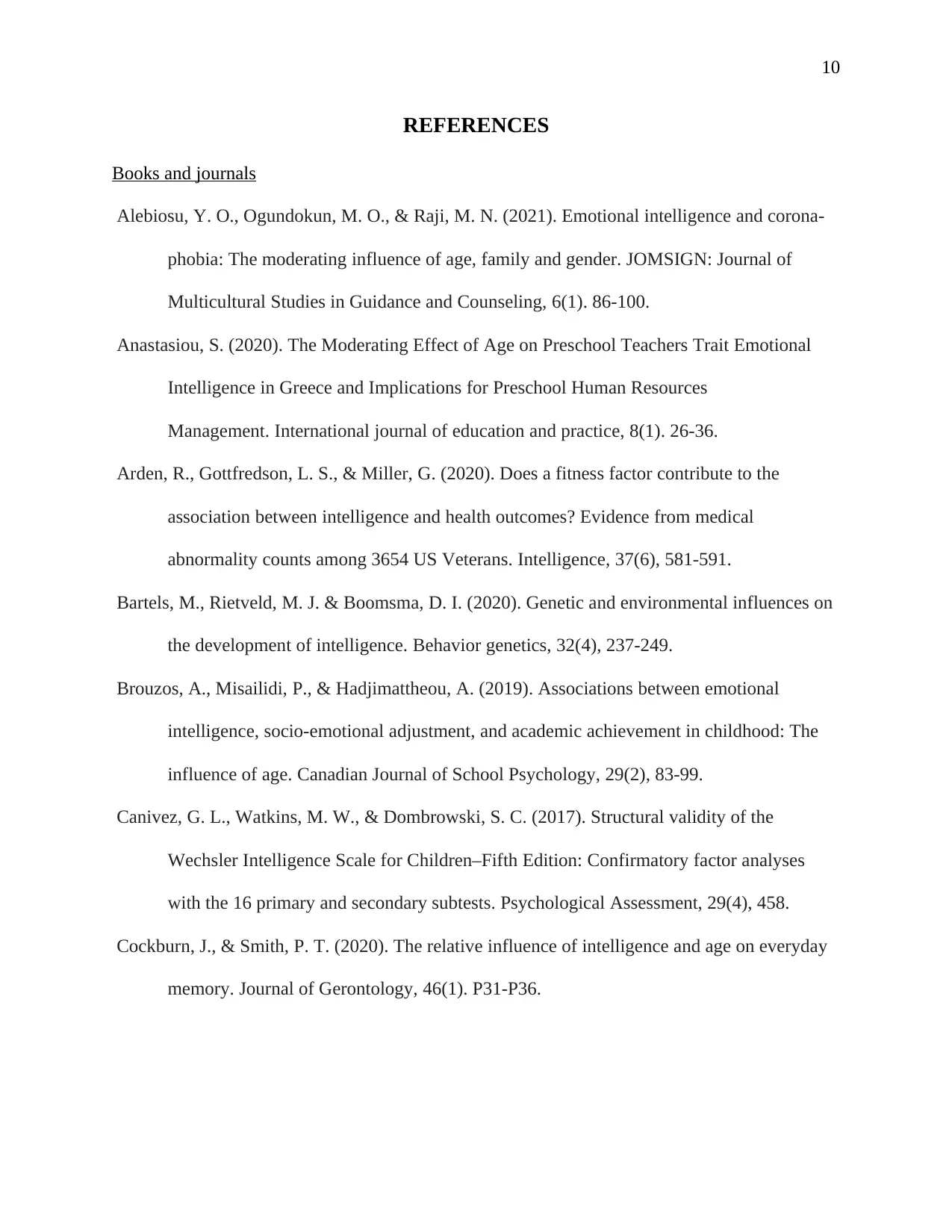
10
REFERENCES
Books and journals
Alebiosu, Y. O., Ogundokun, M. O., & Raji, M. N. (2021). Emotional intelligence and corona-
phobia: The moderating influence of age, family and gender. JOMSIGN: Journal of
Multicultural Studies in Guidance and Counseling, 6(1). 86-100.
Anastasiou, S. (2020). The Moderating Effect of Age on Preschool Teachers Trait Emotional
Intelligence in Greece and Implications for Preschool Human Resources
Management. International journal of education and practice, 8(1). 26-36.
Arden, R., Gottfredson, L. S., & Miller, G. (2020). Does a fitness factor contribute to the
association between intelligence and health outcomes? Evidence from medical
abnormality counts among 3654 US Veterans. Intelligence, 37(6), 581-591.
Bartels, M., Rietveld, M. J. & Boomsma, D. I. (2020). Genetic and environmental influences on
the development of intelligence. Behavior genetics, 32(4), 237-249.
Brouzos, A., Misailidi, P., & Hadjimattheou, A. (2019). Associations between emotional
intelligence, socio-emotional adjustment, and academic achievement in childhood: The
influence of age. Canadian Journal of School Psychology, 29(2), 83-99.
Canivez, G. L., Watkins, M. W., & Dombrowski, S. C. (2017). Structural validity of the
Wechsler Intelligence Scale for Children–Fifth Edition: Confirmatory factor analyses
with the 16 primary and secondary subtests. Psychological Assessment, 29(4), 458.
Cockburn, J., & Smith, P. T. (2020). The relative influence of intelligence and age on everyday
memory. Journal of Gerontology, 46(1). P31-P36.
REFERENCES
Books and journals
Alebiosu, Y. O., Ogundokun, M. O., & Raji, M. N. (2021). Emotional intelligence and corona-
phobia: The moderating influence of age, family and gender. JOMSIGN: Journal of
Multicultural Studies in Guidance and Counseling, 6(1). 86-100.
Anastasiou, S. (2020). The Moderating Effect of Age on Preschool Teachers Trait Emotional
Intelligence in Greece and Implications for Preschool Human Resources
Management. International journal of education and practice, 8(1). 26-36.
Arden, R., Gottfredson, L. S., & Miller, G. (2020). Does a fitness factor contribute to the
association between intelligence and health outcomes? Evidence from medical
abnormality counts among 3654 US Veterans. Intelligence, 37(6), 581-591.
Bartels, M., Rietveld, M. J. & Boomsma, D. I. (2020). Genetic and environmental influences on
the development of intelligence. Behavior genetics, 32(4), 237-249.
Brouzos, A., Misailidi, P., & Hadjimattheou, A. (2019). Associations between emotional
intelligence, socio-emotional adjustment, and academic achievement in childhood: The
influence of age. Canadian Journal of School Psychology, 29(2), 83-99.
Canivez, G. L., Watkins, M. W., & Dombrowski, S. C. (2017). Structural validity of the
Wechsler Intelligence Scale for Children–Fifth Edition: Confirmatory factor analyses
with the 16 primary and secondary subtests. Psychological Assessment, 29(4), 458.
Cockburn, J., & Smith, P. T. (2020). The relative influence of intelligence and age on everyday
memory. Journal of Gerontology, 46(1). P31-P36.
Paraphrase This Document
Need a fresh take? Get an instant paraphrase of this document with our AI Paraphraser
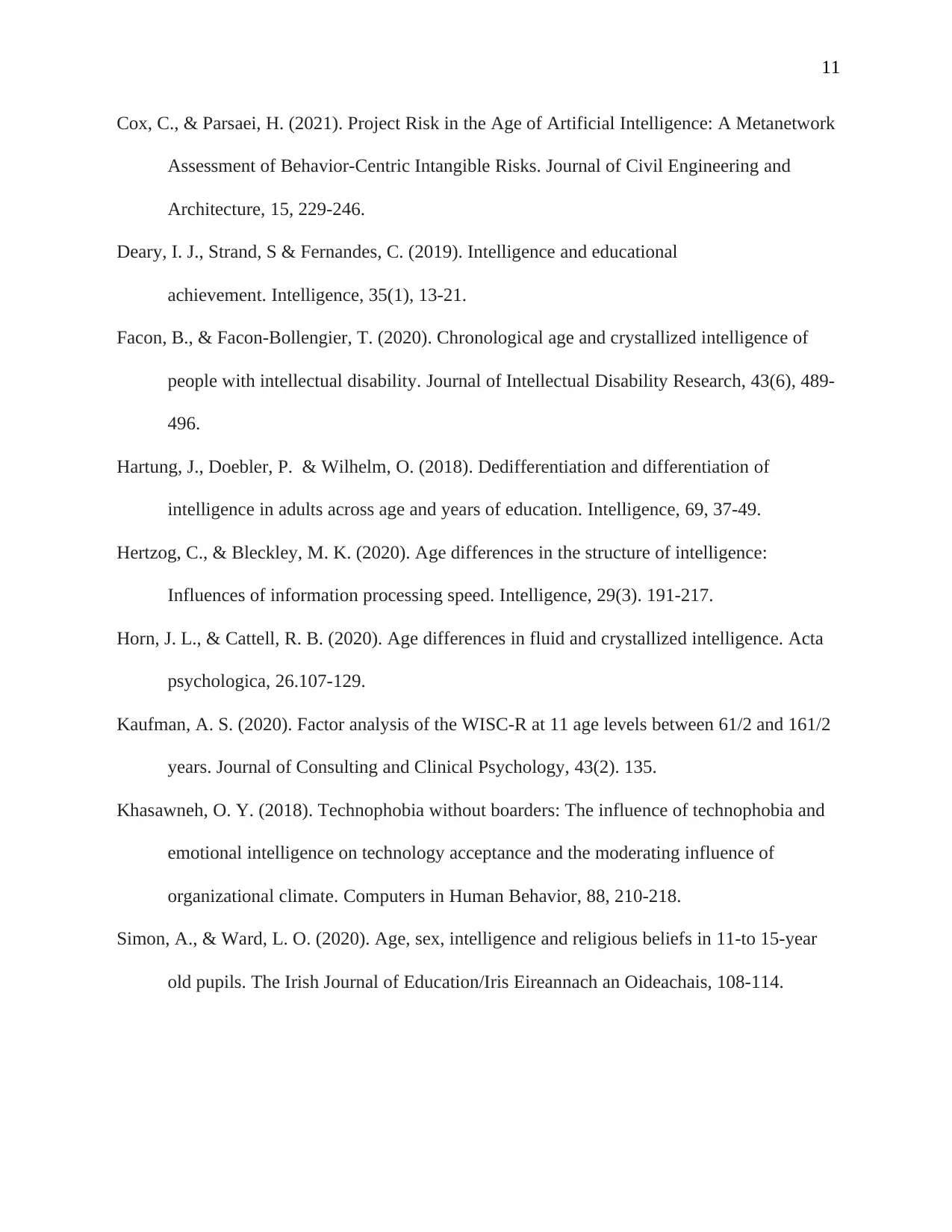
11
Cox, C., & Parsaei, H. (2021). Project Risk in the Age of Artificial Intelligence: A Metanetwork
Assessment of Behavior-Centric Intangible Risks. Journal of Civil Engineering and
Architecture, 15, 229-246.
Deary, I. J., Strand, S & Fernandes, C. (2019). Intelligence and educational
achievement. Intelligence, 35(1), 13-21.
Facon, B., & Facon‐Bollengier, T. (2020). Chronological age and crystallized intelligence of
people with intellectual disability. Journal of Intellectual Disability Research, 43(6), 489-
496.
Hartung, J., Doebler, P. & Wilhelm, O. (2018). Dedifferentiation and differentiation of
intelligence in adults across age and years of education. Intelligence, 69, 37-49.
Hertzog, C., & Bleckley, M. K. (2020). Age differences in the structure of intelligence:
Influences of information processing speed. Intelligence, 29(3). 191-217.
Horn, J. L., & Cattell, R. B. (2020). Age differences in fluid and crystallized intelligence. Acta
psychologica, 26.107-129.
Kaufman, A. S. (2020). Factor analysis of the WISC-R at 11 age levels between 61/2 and 161/2
years. Journal of Consulting and Clinical Psychology, 43(2). 135.
Khasawneh, O. Y. (2018). Technophobia without boarders: The influence of technophobia and
emotional intelligence on technology acceptance and the moderating influence of
organizational climate. Computers in Human Behavior, 88, 210-218.
Simon, A., & Ward, L. O. (2020). Age, sex, intelligence and religious beliefs in 11-to 15-year
old pupils. The Irish Journal of Education/Iris Eireannach an Oideachais, 108-114.
Cox, C., & Parsaei, H. (2021). Project Risk in the Age of Artificial Intelligence: A Metanetwork
Assessment of Behavior-Centric Intangible Risks. Journal of Civil Engineering and
Architecture, 15, 229-246.
Deary, I. J., Strand, S & Fernandes, C. (2019). Intelligence and educational
achievement. Intelligence, 35(1), 13-21.
Facon, B., & Facon‐Bollengier, T. (2020). Chronological age and crystallized intelligence of
people with intellectual disability. Journal of Intellectual Disability Research, 43(6), 489-
496.
Hartung, J., Doebler, P. & Wilhelm, O. (2018). Dedifferentiation and differentiation of
intelligence in adults across age and years of education. Intelligence, 69, 37-49.
Hertzog, C., & Bleckley, M. K. (2020). Age differences in the structure of intelligence:
Influences of information processing speed. Intelligence, 29(3). 191-217.
Horn, J. L., & Cattell, R. B. (2020). Age differences in fluid and crystallized intelligence. Acta
psychologica, 26.107-129.
Kaufman, A. S. (2020). Factor analysis of the WISC-R at 11 age levels between 61/2 and 161/2
years. Journal of Consulting and Clinical Psychology, 43(2). 135.
Khasawneh, O. Y. (2018). Technophobia without boarders: The influence of technophobia and
emotional intelligence on technology acceptance and the moderating influence of
organizational climate. Computers in Human Behavior, 88, 210-218.
Simon, A., & Ward, L. O. (2020). Age, sex, intelligence and religious beliefs in 11-to 15-year
old pupils. The Irish Journal of Education/Iris Eireannach an Oideachais, 108-114.
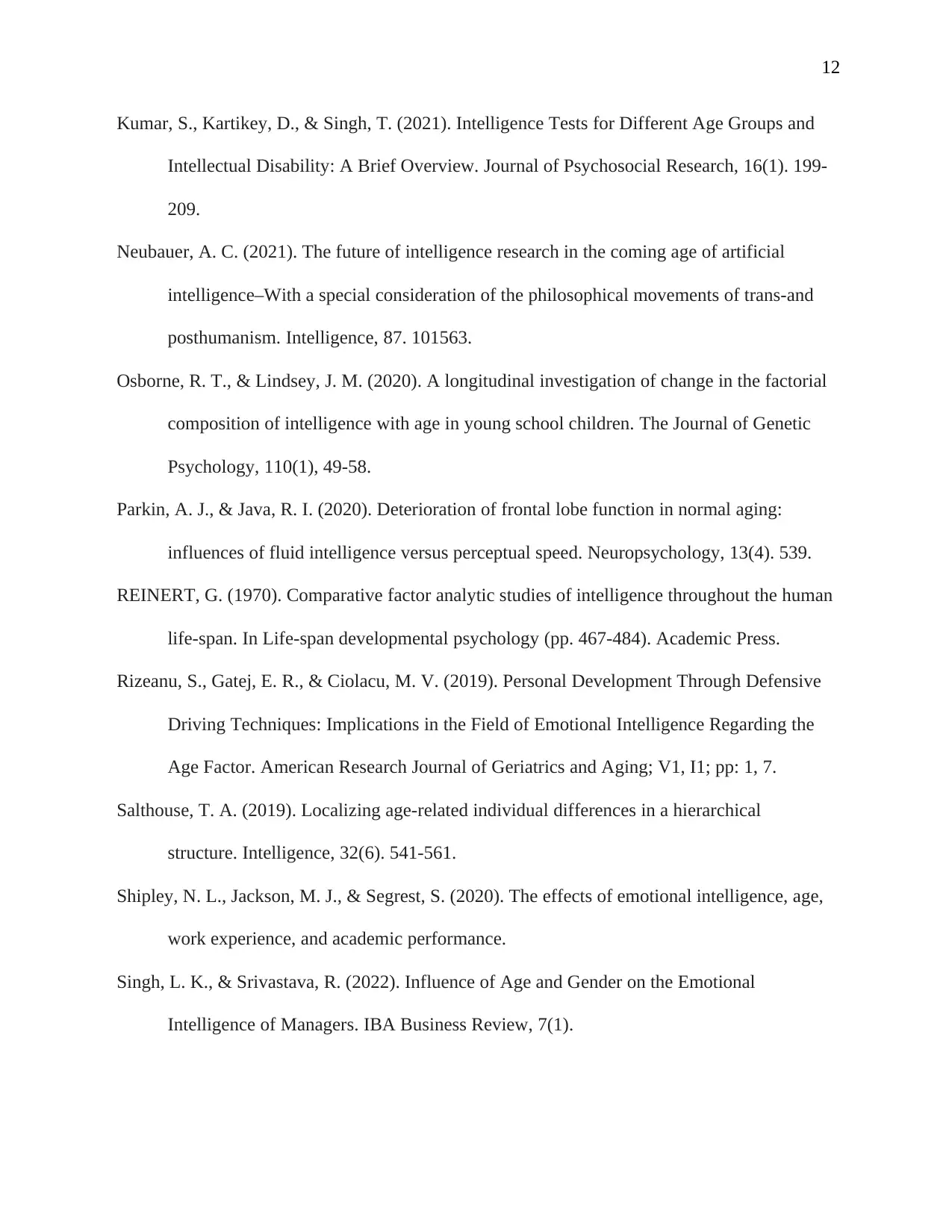
12
Kumar, S., Kartikey, D., & Singh, T. (2021). Intelligence Tests for Different Age Groups and
Intellectual Disability: A Brief Overview. Journal of Psychosocial Research, 16(1). 199-
209.
Neubauer, A. C. (2021). The future of intelligence research in the coming age of artificial
intelligence–With a special consideration of the philosophical movements of trans-and
posthumanism. Intelligence, 87. 101563.
Osborne, R. T., & Lindsey, J. M. (2020). A longitudinal investigation of change in the factorial
composition of intelligence with age in young school children. The Journal of Genetic
Psychology, 110(1), 49-58.
Parkin, A. J., & Java, R. I. (2020). Deterioration of frontal lobe function in normal aging:
influences of fluid intelligence versus perceptual speed. Neuropsychology, 13(4). 539.
REINERT, G. (1970). Comparative factor analytic studies of intelligence throughout the human
life-span. In Life-span developmental psychology (pp. 467-484). Academic Press.
Rizeanu, S., Gatej, E. R., & Ciolacu, M. V. (2019). Personal Development Through Defensive
Driving Techniques: Implications in the Field of Emotional Intelligence Regarding the
Age Factor. American Research Journal of Geriatrics and Aging; V1, I1; pp: 1, 7.
Salthouse, T. A. (2019). Localizing age-related individual differences in a hierarchical
structure. Intelligence, 32(6). 541-561.
Shipley, N. L., Jackson, M. J., & Segrest, S. (2020). The effects of emotional intelligence, age,
work experience, and academic performance.
Singh, L. K., & Srivastava, R. (2022). Influence of Age and Gender on the Emotional
Intelligence of Managers. IBA Business Review, 7(1).
Kumar, S., Kartikey, D., & Singh, T. (2021). Intelligence Tests for Different Age Groups and
Intellectual Disability: A Brief Overview. Journal of Psychosocial Research, 16(1). 199-
209.
Neubauer, A. C. (2021). The future of intelligence research in the coming age of artificial
intelligence–With a special consideration of the philosophical movements of trans-and
posthumanism. Intelligence, 87. 101563.
Osborne, R. T., & Lindsey, J. M. (2020). A longitudinal investigation of change in the factorial
composition of intelligence with age in young school children. The Journal of Genetic
Psychology, 110(1), 49-58.
Parkin, A. J., & Java, R. I. (2020). Deterioration of frontal lobe function in normal aging:
influences of fluid intelligence versus perceptual speed. Neuropsychology, 13(4). 539.
REINERT, G. (1970). Comparative factor analytic studies of intelligence throughout the human
life-span. In Life-span developmental psychology (pp. 467-484). Academic Press.
Rizeanu, S., Gatej, E. R., & Ciolacu, M. V. (2019). Personal Development Through Defensive
Driving Techniques: Implications in the Field of Emotional Intelligence Regarding the
Age Factor. American Research Journal of Geriatrics and Aging; V1, I1; pp: 1, 7.
Salthouse, T. A. (2019). Localizing age-related individual differences in a hierarchical
structure. Intelligence, 32(6). 541-561.
Shipley, N. L., Jackson, M. J., & Segrest, S. (2020). The effects of emotional intelligence, age,
work experience, and academic performance.
Singh, L. K., & Srivastava, R. (2022). Influence of Age and Gender on the Emotional
Intelligence of Managers. IBA Business Review, 7(1).
⊘ This is a preview!⊘
Do you want full access?
Subscribe today to unlock all pages.

Trusted by 1+ million students worldwide
1 out of 13
Related Documents
Your All-in-One AI-Powered Toolkit for Academic Success.
+13062052269
info@desklib.com
Available 24*7 on WhatsApp / Email
![[object Object]](/_next/static/media/star-bottom.7253800d.svg)
Unlock your academic potential
Copyright © 2020–2025 A2Z Services. All Rights Reserved. Developed and managed by ZUCOL.





